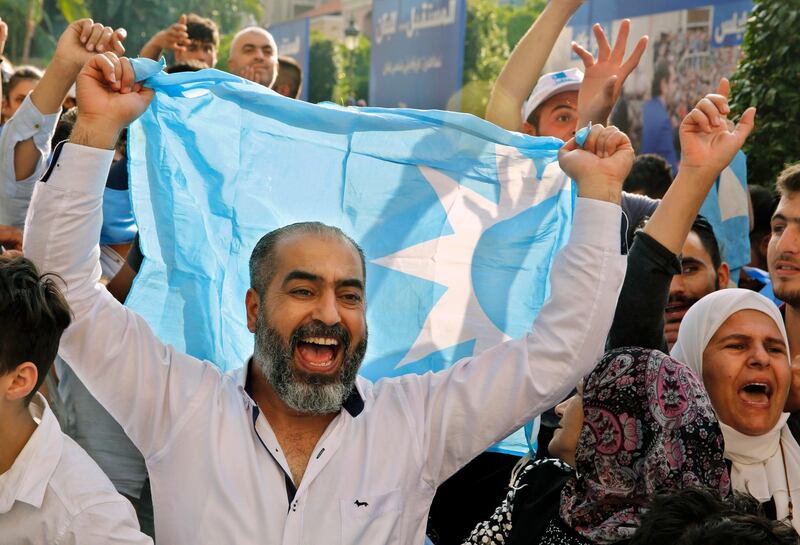Following Lebanon’s first national election in nine years, the country’s political balance is in flux as discussions start on forming the next cabinet and parliament meets to elect its leadership at their first session on Wednesday.
The first step – the selection of a speaker – appeared to be a formality after the major parliamentary blocs either said they would support incumbent speaker Nabih Berri or abstain from casting a ballot. But now comes the tortuous process of forming a cabinet.
When speaking about forming a government in Lebanon, “quickly” means weeks instead of months or even years.
The outgoing government was formed in just four weeks. But prior to that, the government of Tammam Salam took 10 months to finalise. Just six weeks after Mr Salam’s government took their positions, then-president Michel Sleiman left his, and the country entered a 29-month hiatus without a head of state while political factions argued over his successor.
Unlike presidential posts and Cabinet, Mr Berri has been a stalwart for more than two decades and is set to return to his post unopposed. Parties have also struck a broad understanding ahead of Wednesday’s meeting that caretaker Prime Minister Saad Hariri will remain in position.
The horse-trading will now begin for seats around the Cabinet table. Without a fixed number of ministers to appoint, the flexibility can help. But following this month’s election, parties that fared well are looking to increase their representation while those that lost seats are unlikely to want to relinquish converted portfolios.
One potential challenge will be the impact of last week’s US sanctions against Hezbollah officials, and warnings that the group must not take more than their current two posts in Cabinet. After a weekly meeting of his Future Movement parliamentary bloc on Tuesday, Mr Hariri downplayed the impact of the sanctions on the progress of Cabinet formation.
On the other side of the coin, Samir Geagea, head of the Lebanese Forces (LF), could also be a spoiler in any quick formation of a government. An unreserved critic of Hezbollah and its arsenal, his mostly Christian party nearly doubled their seats in parliament from eight to 15. If his party is not handed the representation in Cabinet that they feel they deserve after defying expectations at the ballot box, he will likely draw out the process, or be forced into opposition outside of government.
Mr Geagea has said his party will cast blank ballots on Wednesday when the speaker is selected – not as a slight to Mr Berri, but because the group had decided not to support anyone in the post. He has put forward incoming MP Anis Nassar as a candidate for Mr Berri’s deputy, a post normally reserved for an Orthodox Christian.
___________
Read more
US-Gulf sanctions target top leaders of Hezbollah
Michael Young: Hezbollah's rise is price Lebanon paid for handing control Syria after civil war
Drugs, diamonds and used cars: the Hezbollah network the US destroyed
___________
As of Wednesday evening, incoming politician Elie Ferzli appeared to have the edge on Mr Nassar with most major parties saying they would support him over the LF’s pick. The third candidate, former education minister and MP Elias Bou Saab, had not received much vocal backing.
The position of deputy speaker was held during the most recent government by a member of Mr Hariri’s Future Movement.
Discussing the coming weeks, Abd Moussa, the general media coordinator for Mr Hariri’s party, touched on the desire of the major parties to agree on ministries quickly.
“We hope we will have a government very soon because Lebanon needs that and it cannot waste time on this because all of the issues in Lebanon need a working government,” said Mr Moussa.
The major issues facing Lebanon remain the same. In addition to the political dilemma Hezbollah presents, the country suffers from an ageing and overstretched infrastructure, daily power outages and regular water cuts.
These decades-long issues remain unsolved largely as a result of politics and corruption. However, following a major donor international conference in Paris on April 6 that saw pledges of US$11 billion (Dh40bn) in loans and grants to fix some of Lebanon’s infrastructure woes, parties are keen to keep the recent momentum on economic reform and project implementation.
In its final meeting on Monday, Cabinet passed a dizzying number of final bills including to reissue tenders to boost power generation and rent a third power barge from Turkish company Karadeniz Holding, media reported.
However, not all are hopeful that the next government will be any more effective than their predecessors at fixing Lebanon’s numerous woes.
"This election was bad for the Lebanese voters – they effectively voted in the same people who got them into the mess we are in – they have not solved anything effectively in the last eight or nine years," Sami Attalah, the executive director of the Lebanese Centre for Policy Studies, told The National.
“It’s not about the faces, it’s about the rules of engagement. Are we going to see any sort of major changes in the decision-making process?” Mr Attalah asked. “The political elite came back on top, only some with more seats and some with fewer seats”.





